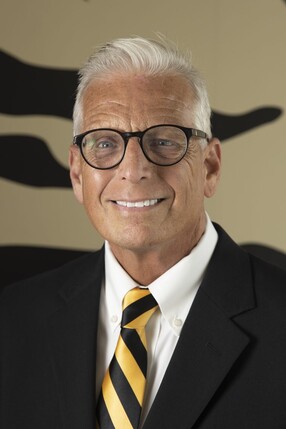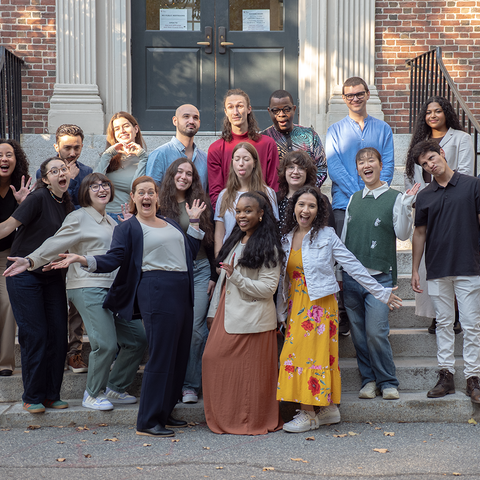A Champion for Students
New dean of students pledges openness, advocacy

On March 10, GSAS Dean Emma Dench announced the appointment of Dr. Bill Stackman as the School’s next dean of students, effective July 17. Currently the vice chancellor for student affairs and dean of students at the University of Missouri, Columbia, Dr. Stackman’s career in higher education spans three decades with experience not only in student affairs but also in educational leadership and administration and in social work. Moreover, he has served students at a wide variety of institutions, from large state schools to top private institutions such as the University of Illinois, Oberlin College, Tufts University, and the University of Notre Dame.
With credentials that include a master’s degree in positive coaching and positive psychology as well as a doctorate in education, Dr. Stackman is particularly concerned with improving the student experience, especially in the areas of mental health and emotional wellness. “He is a visible advocate and champion for students,” wrote Dean Dench in her message to GSAS staff. “His extensive and broad experience in the student services space make him the ideal candidate to lead the Office of Student Affairs.”
Communications spoke recently with Dr. Stackman about coming to GSAS, the challenges graduate students face, and his hopes for his work in the years ahead.
Why did you want to come to GSAS at this point in your distinguished career in higher education?
In recent years, I’ve been working more closely with graduate students. At Notre Dame, I oversaw a center for graduate student life, which helped me understand the particular challenges and needs of those students. Here at “Mizzou,” I created the Graduate Student Presidents Council so leaders of graduate student organizations can meet with each other regularly. GSAS is a terrific opportunity for me to continue this work.
Also, relationships are important to me. Right now, I'm serving 30,000-plus students. When I’m working with a smaller population, I can go a little deeper—to get to know more students and more about each one. That’s something that’s really exciting about the prospect of working at GSAS.
Lastly, I have so much respect for the School as one of the premier PhD programs in the world. When I heard about the search for a new dean of students, I thought, “What a great environment in which to engage with students who are so creative and innovative!”
You said that at Notre Dame and Missouri, you got a better understanding of the challenges of graduate students. What are some of those?
Certainly mental health. Statistics show that problems are increasing at concerning rates for graduate and professional students, in part because they have a host of additional challenges. For instance, the pandemic had a significant impact on the academic job market. That’s elevated the stress that students feel about their career prospects.
I’m sad to say it, but right now in our country students of color and international students are sometimes the targets of violence. So, they have the very basic concern of physical safety.
I think there are also issues with relationships. The whole graduate student experience can be very isolating. When I was studying for my doctorate at Boston University, I had a family. And yet that was one of the loneliest times of my life. I felt enormous pressure to complete my program. Also, like many students, I struggled with imposter syndrome. So, I promised myself that if anyone asked me to be a part of their dissertation process, I would never decline.
You mention the challenge of graduate student mental health. How have you seen the landscape change in that area during your 30-year career in higher education?
For many years, students went to the counseling center mainly to address relationship or career concerns. Now, anxiety is the number one issue, with depression close behind. Social anxiety in particular is up since COVID. And more students come to school with a history of mental health concerns. That’s the bad news.
The good news is that students now have access to therapies and medications that they didn’t years ago. I've also seen a change in the way that we talk about mental health. The stigma remains, but we’re creating a culture in higher education where it’s okay if you’re not feeling okay. The more we can make mental health a part of our normal conversation, the more we can move toward prevention and focus on student flourishing.
What does the School’s goal of inclusive excellence mean to you and how can you draw on your experience working at very different institutions to help foster a sense of belonging among students?
Well, you don’t get to Harvard if you’re not excellent academically, so the emphasis in my job is really on the inclusive part. To me, that means doing everything possible to create an environment where everybody feels welcome. When I start at GSAS, I will work closely with the Office of Equity, Diversity, Inclusion, and Belonging to get a sense of the issues the School is grappling with in those spaces. As part of that collaboration, I also plan to do a lot of listening to BIPOC and LGBTQ+ students. I have always reached out to people who are underrepresented or marginalized everywhere I’ve worked. It’s my job to elevate their needs and speak on their behalf.
As you mention, I've often moved between colleges and universities that were in many ways at opposite poles from each other. For example, I started at Glenville State College in rural West Virginia, where we had one stop light for the whole county. Then I went to Temple University in Philadelphia, one of the country’s biggest and most diverse cities. I’ve worked at the University of Illinois, a big 10 school; Notre Dame, a Catholic university; Tufts, Missouri, and a few others. What I’ve learned is that it’s important to adapt and focus on the priorities of each school. Here at Missouri, those are diversity and inclusion, mental health, student success, and healthy organizations—all priorities for GSAS as well.
Finally, if you could speak directly to students reading this interview, what would you tell them about your hopes for your time as dean of students? And what would you like to know from them?
I would tell them that I have a passion for this work. I care deeply about students and their educational experience. I want them to be successful.
My hope is that we can have a close and meaningful relationship based on mutual trust and respect. When I get to campus, I will be visible. I will have an open-door approach to working with students. I’m hopeful that I can build relationships so that I can learn about and be an advocate for them.
What I would ask students is, “How can I support you? What are your needs? What are your challenges?” I’d ask them to invite me to their events so that I can show up and engage with them. And I’d ask them about the best ways to stay in touch. Communication is critical. How can we stay connected?
Get the Latest Updates
Join Our Newsletter
Subscribe to Colloquy Podcast
Simplecast





